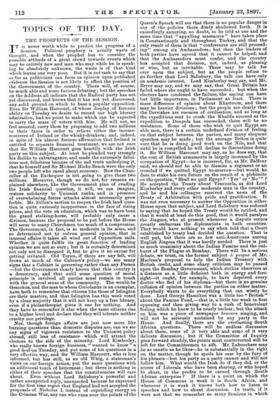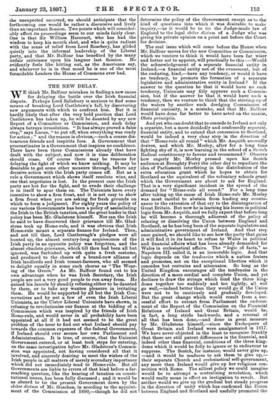TOPICS OF THE DAY.
THE PROSPECTS OF THE SESSION.
IT is never worth while to predict the progress of a Session. Political prophecy is usually waste of thought, and when the prophet has to consider the possible attitude of a great crowd towards events which may be entirely new and men who may while he is speak- ing be absolutely unknown, the waste is of that kind which leaves one very poor. But it is not rash to say that as far as politicians can form an opinion upon published evidence the Session is not likely to affect the position of the Government of the country. There will, of course, be much able and some furious debating ; but the speeches on the Address all indicate that the Radical party has not yet discovered, and knows that it has not yet discovered, any solid ground on which to base a popular opposition. Even Sir William Harcourt, of whose display of forensic ability on Tuesday we desire to record our high literary admiration, had no point to make which can be expected to carry the mass of voters with him. He will not, we feel assured, carry them by proposing to add two millions to their taxes in order to relieve either the income- receivers of Ireland or the whisky-drinkers ; and, indeed, in spite of his almost furious affirmation that Ireland is entitled to separate financial treatment, we are not sure that Sir William Harcourt goes heartily with the Irish party on this subject. At least he pleaded very strongly his dislike to extravagance, and made the extremely felici- tous mot, felicitous because of the sad truth underlying it, that he himself and Sir Michael Hicks-Beach were the only two people left who cared about economy. Now the Chan- cellor of the Exchequer is not going to give those two millions. Moreover, though we do not, for reasons ex- plained elsewhere, like the Government plan of evading the Irish financial question, it will, we can imagine, restore solidarity to Unionist ranks, and in presence of overwhelming forces attacks almost necessarily grow feeble. Mr. Dillon's motion to reopen the Irish land ques- tion is quite curiously inopportune in the face of rising prices, and the vote on education, which was to have been the grand stalking-horse, will probably only cause a division, because the proposal to be put before the House will seem to many Churchmen too much of a compromise. The Government, in fact, is so moderate in its aims, and so determined not to outrun general opinion, that in internal affairs it takes all wind out of Opposition sails. Whether it quite fulfils its great function of leading opinion we are not so sure ; but it is certainly determined not only not to disregard it, but to give it no excuse for getting irritated. Old Tories, if there are any left, will frown at much of the Cabinet's policy—we see many signs that a Cabinet is governing rather than any Person —but the Government clearly knows that this country is a democracy, and that until some question of moral principle is involved all parties must remain in touch with the general sense of the community. The would-be Gracchus, and the man to whom Coriolanus is an exemplar, have both to remember that citizens like those of Islington are their masters, and that Islington has this week voted by a clear majority that it will not keep up a free library, even if a philanthropist gives it one for nothing. And they have to remember it also when the same citizens rise to a higher level and declare that they will tolerate neither cruelty nor privilege.
Nor, though foreign affairs are just now more like burning questions than domestic disputes are, can we see any signs of vigorous resistance to the Unionist policy abroad, still less of resistance which will attract the electors to the side of the minority. Lord Kimberley, who really knows foreign business, "wanted to know" a good deal on Tuesday, and put some of his questions in a very effective way, and Sir William Harcourt, who is less informed, but has still, as an old Whig, a statesman's views on our foreign action, put the same questions with an additional touch of bitterness ; but there is nothing in either of their speeches that the constituencies will care about. Even without Lord Salisbury's powerful and rather unexpected reply, unexpected because he expressed for the first time regret that England had not accepted the proposals of Nicholas I. instead of expending energy on the Crimean War, any one who runs over the points of the Queen's Speech will see that there is no popular danger in any of the policies there dimly shadowed forth. It is exceedingly annoying, no doubt, to be told at one and the same time that "appalling massacres" have taken place in Constantinople and throughout Turkey, and that the only result of them is that "conferences are still proceed- ing " among six Ambassadors ; but then the leaders of both parties have agreed that it cannot be helped, and that the Ambassadors must confer, and the country has accepted that decision, not, indeed, as pleasing or wise, but as inevitable. There may be talk for ever upon the subject, but as the people refuse to go further than Lord Salisbury, the talk can have only an academic interest. Lord Kimberley may say, and Mr. Bryce may say, and we may say, that Great Britain has failed where she ought to have succeeded ; but when the electors have condoned the failure, the saying can have but little importance, in Parliament at least. There is more difference of opinion about Khartoum, and there may be heavier divisions ; but the people see clearly that. the Dervishes are enemies of civilisation, and so long as- the expeditions sent to crush the Khalifa succeed as the expedition to Dongola has succeeded, there will be no resistance. Some of those who wish to quit Egypt are- able men, there is a, certain undefined division of feeling on that subject between the parties, and many eloquent speeches may be made ; but the average Briton is quite sure that he is doing good work on the Nile, and that until he is compelled he will decline to discontinue doing it. Sir William Harcourt may say, as he does say, that the cost of British armaments is largely increased by the occupation of Egypt—he is incorrect, for, as Mr. Balfour said, we should not be able to dismiss a regiment or an ironclad if we quitted Egypt. to-morrow—but would he dare to stake his own future on the result of a plebiscite on the question," Shall we quit Egypt ? ' Yes ' or No ' " He accepted the Treaty about Venezuela, as did Lord Kimberley and every other moderate man in the country, and he and his colleague received the news of the Treaty of Arbitration with pride and gratification. It was not even necessary to answer the Opposition in either House upon that subject, and Lord Salisbury was reduced to saying that he hoped the Treaty would be ratified, and that it would at least do this good, that it would paralyse the Jingoes, who at present whenever a dispute occurs greatly embarrass the diplomatists in both countries. They would have nothing to say when told that a Court established by treaty had decided the question. That is well put, but there are so few anti-Americans among English Jingoes that it was hardly needed There is just as much unanimity about the Indian Famine and the out- burst of the Plague at Bombay. There will be a serious debate, we trust, on the former subject a propos of Mr. . Maclean's proposal to help the Indian Treasury with. British credit, and some sharp criticism may be passed upon the Bombay Government, which strikes observers at a distance as a little deficient both in energy and fore- sight—it ought, for example, to have deprived every doctor who fled of his diploma—but there is no genuine collision of opinion between the parties on either matter. Everybody wants to do everything that can wisely be done. Lord George Hamilton was a little too "British"' about the Famine Fund,—that is, a little too weak in first, opposing and then giving way to a rush of benevolent feeling which he knew to be nearly useless ; but the attack on him was a piece of newspaper bravura singing, and. . will not be seriously sustained by any party in the House. And finally, there are the everlasting South African questions. There will be endless discussion about them, some of it very able and some of it very delicate discussion ; but if the Committee of Inquiry goes forward steadily, the points most controverted will be left for the Committeemen to sift. Mr. Labouchere may be as caustic as he likes—he is substantially in the right on the matter, though he spoils his case by the fury of his phrases—but his party as a party cannot and will not follow him. What would the Irish do if they did, or the scores of Liberals who have been sharing, or who hoped to share, in the profits to be earned through South African enterprise ? If there is a point on which the House of Commons is weak it is South Africa, and whenever it is weak it knows both how to listen to speeches and how to shunt discussion. In truth, if it were not that we remember so many Sessions in which the unexpected occurred, we should anticipate that the forthcoming one would be rather a discursive and lively than an important Session. Two points which will consider- ably affect its proceedings seem to our minds fairly clear. One is that Sir William Harcourt, who has had the wisdom to keep his mouth shut, and who is quite radiant with the sense of relief from Lord R,osebery, has glided quietly into the informal leadership of the Liberal party, and that Mr. Balfour has benefited by the many unfair criticisms upon his languor last Session. He evidently feels like hitting out, as the Americans say, and whenever he is in that mood he is one of the most formidable Leaders the House of Commons ever bad.



































 Previous page
Previous page